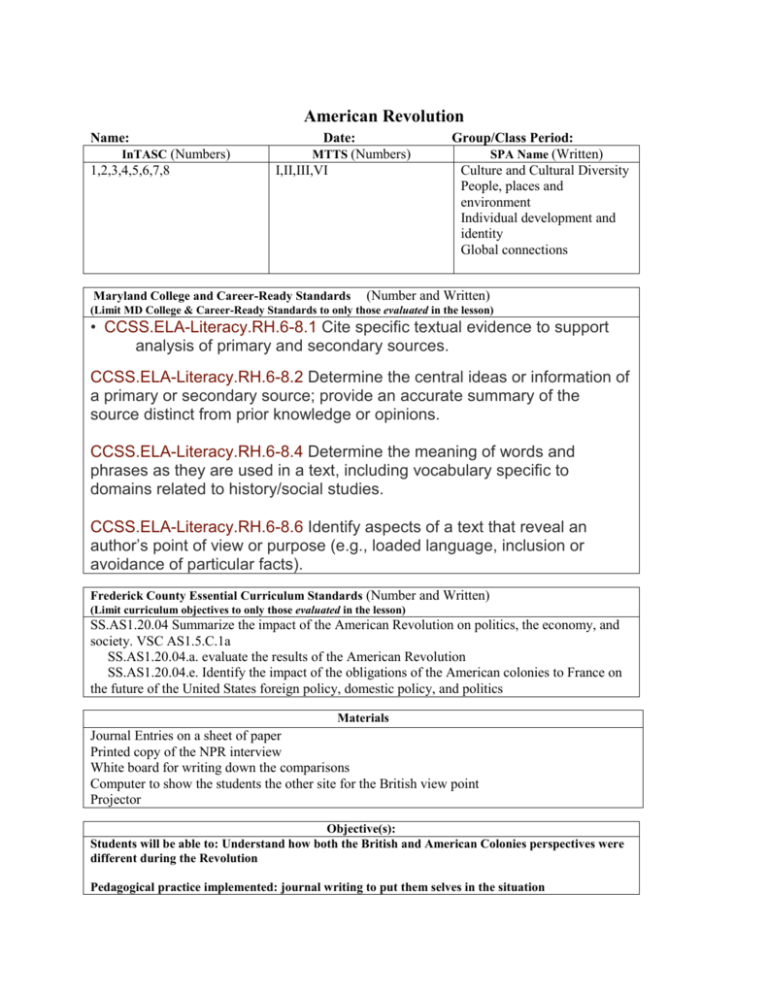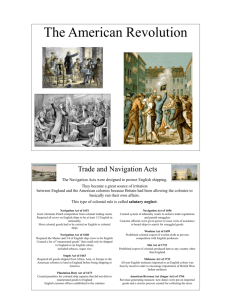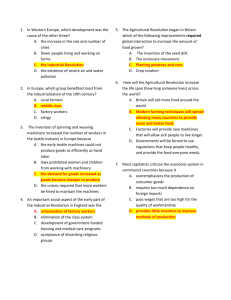
American Revolution
Name:
InTASC (Numbers)
1,2,3,4,5,6,7,8
Date:
MTTS (Numbers)
I,II,III,VI
Maryland College and Career-Ready Standards
Group/Class Period:
SPA Name (Written)
Culture and Cultural Diversity
People, places and
environment
Individual development and
identity
Global connections
(Number and Written)
(Limit MD College & Career-Ready Standards to only those evaluated in the lesson)
• CCSS.ELA-Literacy.RH.6-8.1 Cite specific textual evidence to support
analysis of primary and secondary sources.
CCSS.ELA-Literacy.RH.6-8.2 Determine the central ideas or information of
a primary or secondary source; provide an accurate summary of the
source distinct from prior knowledge or opinions.
CCSS.ELA-Literacy.RH.6-8.4 Determine the meaning of words and
phrases as they are used in a text, including vocabulary specific to
domains related to history/social studies.
CCSS.ELA-Literacy.RH.6-8.6 Identify aspects of a text that reveal an
author’s point of view or purpose (e.g., loaded language, inclusion or
avoidance of particular facts).
Frederick County Essential Curriculum Standards (Number and Written)
(Limit curriculum objectives to only those evaluated in the lesson)
SS.AS1.20.04 Summarize the impact of the American Revolution on politics, the economy, and
society. VSC AS1.5.C.1a
SS.AS1.20.04.a. evaluate the results of the American Revolution
SS.AS1.20.04.e. Identify the impact of the obligations of the American colonies to France on
the future of the United States foreign policy, domestic policy, and politics
Materials
Journal Entries on a sheet of paper
Printed copy of the NPR interview
White board for writing down the comparisons
Computer to show the students the other site for the British view point
Projector
Objective(s):
Students will be able to: Understand how both the British and American Colonies perspectives were
different during the Revolution
Pedagogical practice implemented: journal writing to put them selves in the situation
The expectation of achievement is: To better understand how there are many perspectives and how
they can differ dramatically depending on the situation. All of the students will listen to the talk
about the American side of the revolution. They will then complete the reading given to them. I
expect that most of the class will be able to finish their journal entries before the end of the period
given that they will have enough time. If they do not they are expected to complete it as homework.
Rationale for Pedagogical Practice (a brief summation):
In the world we live in today there is more diversity than ever. Living on one street in America you
could have families from the U.S., Canada, Germany and Australia. What this brings up is different
outlooks and perspectives on life. This can be a problem because all to often individuals only take into
account their own perspectives and do not think about others. This can lead to problems in the
community so it is important to understand that differences are okay and to be rational about how
other people view the world. Not everyone was raised the same but we all have to be tolerant. This can
be helpful for them both in and outside of school.
Clock
Time
Motivation (include questions to be asked)
5 min
9:009:05
Ask students how they would feel if they found a $100 dollar bill on the ground. The
answer will more than likely be very excited. Then ask them how they would feel if
they lost a $100 dollar bill. They should all be upset about this. After we had that
discussion I would relate this to the American Revolution with Great Britain losing the
American Colonies and the Colonies becoming free. End the motivation with a brief
statement about how history is all about perspectives. To some people an event could
be great; to some it could be terrible. Now lets look at the American Revolution.
Clock
Time
Instructional Procedures and Content Notes (inserted or appended)
Assessment
Include questions to be asked
Include meaningful integration of technology
Identify Guided Practice, Modeling and Independent Practice components in lessons where
appropriate
Identify Closure for any lesson where instructional procedures span multiple periods or
days
10 min
9:059:15
Focus on America first since most students should have a good
understanding of the positive effects that the American Revolution
had for the colonies. Since this should be a well-known topic I will
ask students to give me a list of positive, and negative, outcomes that
accompanied the American Colonies after the revolution. I will write
them on the board.
Informal
assessment
with the list. I
can guide
them in the
right direction
if needed.
20 min
9:159:35
This section is over the British side of the American Revolution.
Since they students may not have ever thought about this side of the
argument I will spend more time on it and have more resources
available to them. First I will give them a handout with a transcript of
an NPR interview with Professor Stanley Weintraub (Author, "Iron
Tears") (NPR, 2005)This should outline the outlook from the British
side of the revolution. Once the students have read this I will continue
to ask them some examples of outcomes, both positive and negative,
from the British side of the Revolution. I will write them on the board
so that they can compare the two of them.
Informal as
well
10 min
9:359:45
After we have gone over the two sides the students are to write a
journal entry as if they are a citizen in Great Britain and their
response to the American Revolution. I want them to write a brief
entry of 8-10 sentences explaining their thoughts on the event
including things that we had talked about and discussed in class. Will
have another site available to the students in case they want to further
their knowledge on the American Revolution from the British
viewpoint. (BBC, 2011) As well as an American perspective on the
Revolution. (NPS, 2008)
Student
journals from
the British
view point of
the revolution
Culturally Diverse Learners (CDL):
This work has both a listening and reading aspect as well as a writing aspect. All of which are
controlled as to make it easier on the students. This assignment will help to build bridges to real life
scenarios. Being able to understand that actions can have different implications on different people is
an important thing to understand if we wish to be successful.
Homework: (if applicable)
If they do not finish the journal in class then it is homework.
Closure: end the lesson with the thought that not everything has the same impact for
everyone. This is seen today in the wars we are involved in to the debate to between samesex marriage.
Accommodations (IEP, ILP, and 504)
Allow them to use a computer to do the work.
If needed they can simply talk to me about their
thoughts from a British standpoint so that I know they
understand the content
Enrichment/Acceleration
Giving them extra sites so that they can continue
to learn about the topic on their own time.
Great site for further reading:
http://www.redcoat.me.uk/Rev-War.htm
Modifications (only apply if changing curriculum): N/A
Sources: Include electronic and printed materials as well as acknowledgement of any influence or guidance provided in
the development of the lesson (use APA citation format):
Bibliography
BBC. (2011, Feb 17). BBC History. Retrieved Feb 8, 2014, from Was the American Revolution
Inevitable?:
http://www.bbc.co.uk/history/british/empire_seapower/american_revolution_01.shtml
NPR. (2005). 'Iron Tears,' a British View of American Revolution. Retrieved Feb 8, 2014, from
NPR Books: http://www.npr.org/templates/story/story.php?storyId=4727956
NPS. (2008, Dec 4). NPS.Gov. Retrieved Feb 8, 2014, from The American Revolution :
http://www.nps.gov/revwar/about_the_revolution/consequences_war.html
The British Library Board. (n.d.). Online Gallery The American Revolution. Retrieved from
British Library: http://www.bl.uk/onlinegallery/features/americanrevolution/
Lesson Reflection: (Reflections must include 1. classroom management; 2. connections to theory and
methodology; 3. student achievement; 4. methods selected and the degree of success in reaching students with
those methods)
'Iron Tears,' a British View of American Revolution
Copyright © 2005 NPR. For personal, noncommercial use only. See Terms of Use. For other
uses, prior permission required.
LIANE HANSEN, host:
This weekend, to mark the Fourth of July, Independence Day, festivities are scheduled in small
towns and large to celebrate the American Colonies severing ties with the British crown. Seen through
American eyes, the new nation's Founding Fathers were all noble, guided by lofty ideals. But through
British eyes, events and people were, not surprisingly, seen quite differently. Historian Stanley Weintraub
provides that perspective in his new book, "Iron Tears: America's Battle for Freedom, Britain's Quagmire,
1775-1783." When he spoke to us last week, he explained that the British felt the Colonies were indebted
to them and should be more appreciative.
Professor STANLEY WEINTRAUB (Author, "Iron Tears"): They felt that the American
colonists owed them a great deal for protection, for purveying their culture, for providing them with
manufacturers. But what they didn't say is that they prevented manufacturers from being made in
American Colonies themselves; they wanted to keep the economy dependent on England. So when the
American Revolution actually began, there was no way to make gunpowder in America. There were no
armories to make rifles or cannon; they had to import them or take them from the British. We were totally
unprepared for war because the British made sure we weren't by making them dependent. And so the
resentment in America was dependency.
HANSEN: Well, what about British Parliament? I mean, was everyone in agreement about how
to deal with the American Colonies?
Prof. WEINTRAUB: No. The British Parliament was quite unrepresentative. The British
Parliament largely was based on men who were elected from the small towns and farmlands and not from
the burgeoning big cities that were growing up with the Industrial Revolution. So Manchester or
Birmingham didn't have any seats in Parliament, and the British said, `Why are you complaining, you in
America? The same thing's true over here. We're not representative, but we're happy.'
HANSEN: Hmm. How important, though, were the Colonies to Britain?
Prof. WEINTRAUB: They were very important as a source of raw materials, particularly
agricultural materials and tobacco. But the Colonies were also important as a source of pride. We think in
terms of `the jewel in the crown' applied to India, but that term was really first applied to the American
Colonies. They were the jewel in the king's crown.
HANSEN: So you have this deep resentment growing on both sides, on the British side and on
the American side, and the protests against the taxes were beginning to grow. Did the view begin to
change? Did the resentment begin to build?
Prof. WEINTRAUB: The resentment built on the part of the patriots, patriots who were really
extremists, largely in the Northeast, like Massachusetts. And when the Tea Party occurred and the bales
of tea were thrown overboard, Benjamin Franklin actually said, `This was an act of piracy and the
Americans should repay the British for the tea.' So it took a long time before people we consider the super
patriots of the country to get around to the extreme view of separation.
HANSEN: Let's go to April 19th, 1775; British troops firing on American militia at Lexington
and Concord. The idea of going to war--Did all the Britons think that going to war with America was a
good idea?
Prof. WEINTRAUB: They were very surprised when we went to war. They were surprised
especially when they lost.
(Soundbite of laughter)
HANSEN: But were--well, they were surprised when it actually started.
Prof. WEINTRAUB: When it started. They weren't prepared for it, and they hadn't realized that
the American militias that were building up at the time, particularly in places like Virginia and in
Massachusetts, were armed. They were armed largely because they had hunting rifles. They had very little
sources of ammunition. And the British at Bunker Hill lost a lot of men, and it took so long before the
news got to England--the patriots were very shrewd. They rushed the news and newspapers to England
faster than the British could send their official communiques. And so the American spin, the patriots' spin
on the war, affected England before the government could put its own spin on the war.
HANSEN: So how did the British public first react to the idea of war with...
Prof. WEINTRAUB: They reacted with shock, especially with the casualties that came across.
And they reacted with shock when they realized that their taxes would have to go up. They couldn't get
taxation out of America. And not only did their taxes go up, their taxes were on every little thing one
could imagine. Not merely tea or stamps or newspapers, but even rabbit hair for women's hats was taxed.
Ink, paper, all kinds of things were taxed. And these were nuisance taxes because the British didn't want
to raise the property tax, but eventually they had to do that, too. And so the war was largely unpopular
because it was an economic dent in the British.
HANSEN: So in talking about the execution of the war, was Britain's heart really in it?
Prof. WEINTRAUB: Not the heart of the merchants. The merchants were very hostile to the war.
This was the radical center of the war because the businessmen were taking a big hit. They wanted the
trade to continue, and there was no trade.
HANSEN: Hmm. So ultimately, why do you think Britain lost the war?
Prof. WEINTRAUB: Britain lost the war because General Washington had two other generals on
his side. One was `General Demography,' population. The population was burgeoning. And the other
general that Washington had on his side was `General Atlantic,' that is Atlantic Ocean. It took two and a
half months to cross the Atlantic by sail against the wind. By the time the Donald Rumsfeld of that war,
the secretary for America, Lord George Germaine, sent his orders across to America 3,000 miles away, it
was too late; the orders were moot. Things had changed. It took two and a half months. So General
Atlantic, meaning `General Distance,' and `General Demography,' meaning population, were really
generals who aided Washington tremendously.
HANSEN: Why was it important for you to present the Revolutionary War from the British point
of view?
Prof. WEINTRAUB: The losers seldom ever write the history. We've always had flag-waving
histories. And it's nice to have flag-waving histories, but I think we needed some balance to see what the
war was like from the lens of the British. How did they see it? How did they take to it?
HANSEN: Stanley Weintraub is the Evan Pugh Professor Emeritus of Arts and Humanities at
Pennsylvania State University. His newest book is "Iron Tears: America's Battle for Freedom, Britain's
Quagmire, 1775-1783," published by the Free Press.
Thanks so much for coming in.
Prof. WEINTRAUB: You're welcome. Glad to be with you.
Copyright © 2005 NPR. All rights reserved. No quotes from the materials contained herein may
be used in any media without attribution to NPR. This transcript is provided for personal, noncommercial
use only, pursuant to our Terms of Use. Any other use requires NPR's prior permission. Visit our
permissions page for further information.
NPR transcripts are created on a rush deadline by a contractor for NPR, and accuracy and
availability may vary. This text may not be in its final form and may be updated or revised in the
future. Please be aware that the authoritative record of NPR's programming is the audio.










